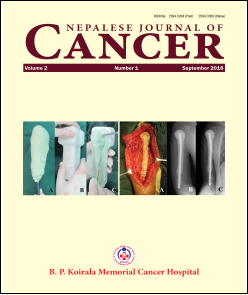Effectiveness of Fosaprepitant in Combination with 5-HT3 Receptor Antagonist and Dexamethasone in Management of Chemotherapy Induced Nausea and Vomiting
DOI:
https://doi.org/10.3126/njc.v2i1.25650Keywords:
Diclogenac, Tramadol, AnalgesiaAbstract
Introduction: Chemotherapy-induced nausea and vomiting (CINV) is one of the common side effects of cancer chemotherapy, that affects patient’s physical and psychological aspects, decreasing patients quality of life and compliance with therapy. CINV can be acute, delayed or anticipatory. This study assessed effectiveness of fosaprepitant (NK-1 receptor antagonist) in combination with 5-hydroxytryptamine-3 receptor antagonist (5-HT3 RA) plus dexamethasone in prevention and management of nausea and vomiting in patients receiving broad range of chemotherapy regimens.
Materials and methods: The current study is prospective study conducted on randomly selected 72 patients during first and second cycle of standard chemotherapeutic regimens. During 144 cycles of chemotherapy patients were randomly assigned in two different anti emetic regimen; triplet regimen (aprepitant, 5-HT3 RA, dexamethasone) and duplet regimen (5-HT3 RA, dexamethasone). All the patients were interviewed using MASCC antiemesis tool (MAT) for incidence of nausea and vomiting. Nausea and vomiting was assessed for 5 days following 1st day of each chemotherapy cycle.
Results: During the period of study, duplet regimen was administered in 68 cycles and triplet regimen was administered in 76 cycles of chemotherapy. Most of the chemotherapy regimen were platinum based compounds (61%). In duplet regimen 76.6 % (52/68) and 72.1% (49/68) patients had acute and delayed vomiting respectively whereas in triplet regimen 7.9% (6/76) and 5.3% (4/76) patients had acute and delayed vomiting respectively. Complete response in triplet regimen were achieved in 89 % of chemotherapy cycles which were significantly low in duplet regimen 10 % only.
Conclusions: This study concludes that addition of fosaprepitant in combination with 5-HT3 RA and dexamethasone prevents CIMV in cancer patients receiving chemotherapy.
Downloads
Downloads
Published
How to Cite
Issue
Section
License
This license lets others distribute, remix, tweak, and build upon your work, even commercially, as long as NJC and the authors are acknowledged.
Submission of the manuscript means that the authors agree to assign exclusive copyright to NJC. The aim of NJC is to increase the visibility and ease of use of open access scientific and scholarly articles thereby promoting their increased usage and impact.




